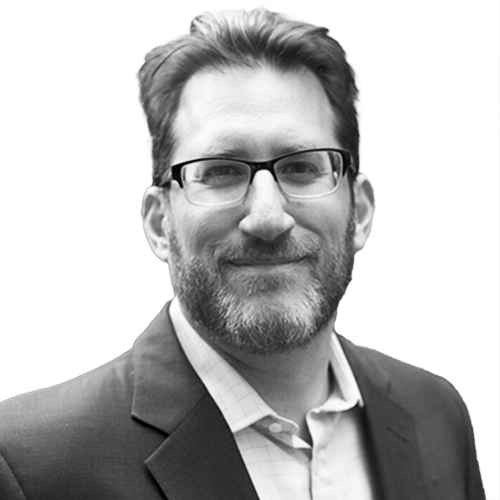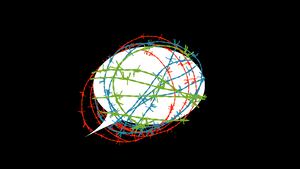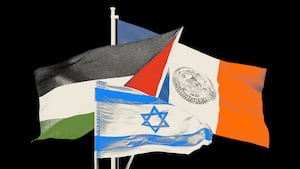Of all the awful consequences of the Oct. 7 massacre in Israel, one stands out above all else: that the savage murder of more than 1,200 Israelis and the kidnapping of hundreds of others has led to the most significant wave of anti-Jewish hatred in recent American history.
It adds insult to profound injury—and if public opinion is to be believed, things may only get worse for American Jews.
According to a report last week from the Anti-Defamation League (ADL), there have been more antisemitic incidents since Oct. 7 than any other two-month period since the ADL started keeping such statistics 45 years ago. (In New York City alone, there’s been a reported 85 percent increase in antisemitic property crime since Oct. 7.)
These episodes will be all too familiar to American Jews, repeated over Shabbat dinners and group texts since Oct. 7: antisemitic vandalism and mass protests outside Jewish-owned businesses across the country, including a falafel shop in Philadelphia; yarmulke-wearing Jews attacked and yelled at in public; swastikas and assaults against Jews outside synagogues and at community centers; and countless pro-Palestinian rallies where protesters voice blatantly antisemitic and even genocidal rhetoric.
On college campuses, the situation is even more acute. A recent poll of Jewish college students found that nearly three-quarters have experienced or witnessed antisemitism in the current school year.
But while some might wave these off as the actions of political extremists or neo-Nazis, public opinion data shows something far more concerning—that anti-Jewish sentiment is increasingly embedding itself in the views of younger Americans.
A recent Harris/Harvard poll asked, “Do you think that Jews as a class are oppressors and should be treated as oppressors, or is that a false ideology?” Seventy-three percent of those queried said “no,” but among those aged 18-24, the answers were quite different: 67 percent said “yes.” Even among those aged 25-34, 44 percent agreed that Jews are “as a class oppressors.”
To be fair, the Harris/Harvard poll is generally considered…less than precise. But as The Bulwark’s Will Saletan points out, these numbers are consistent with other recent polling results.

Bella Ingber, a college student from New York University, speaks during a news conference at the U.S. Capitol on Dec. 5, 2023 in Washington, DC.
Drew Angerer/Getty ImagesAntipathy toward Israel is far more significant among younger Americans. A Quinnipiac poll last month indicated that those under the age of 35 were far more sympathetic to Palestinians (52 percent) than Israelis (29 percent).
Young people were far more likely to characterize Israel as an apartheid state, disagree that Israel has a right to exist, and embrace the view that the only solution to the Arab-Israeli conflict is for Israel to disappear. Not surprisingly, young people were also more inclined to support Hamas or blame Israel for the events of Oct. 7.
But what is most disturbing about recent polling on Israel is the extent to which negative views about a Jewish state are now shaping attitudes toward Jews, in general.
Those under 30 are far more likely to view antisemitism as not a serious problem, particularly in comparison to Islamophobia and anti-Arab attitudes (even though Jews are six times more likely to be the victims of hate crimes than American Muslims).
Young people are more inclined to believe that “Jews have too much power in America,” and nearly one in four agree with the statement that “the Holocaust has been exaggerated.” In addition, according to a recent YouGov/Economist poll, 20 percent of young people believe the Holocaust is a myth, while 30 percent were unsure. And these attitudes pre-date Oct. 7.
With so many young people skeptical about antisemitism and unsure if the Holocaust really happened, it perhaps shouldn’t come as a surprise that they are also far more likely to view Jews as “oppressors.”
But these numbers beg an obvious and disconcerting question: why have young people turned so decisively against Jews?
The cynical and historical answer is: why should they be different?
For centuries, Jews have been stereotyped as conniving, wealthy, privileged and powerful. In the antisemitic conspiratorial worldview, Jews are the puppetmasters who secretly run the world. People that powerful surely can’t be oppressed; they must be the oppressors. So young people are merely following a long-standing Western tradition—updated with a progressive social justice sheen.
But historical antisemitism cannot explain the deep reservoirs of antipathy directed at Israel and Diaspora Jews since Oct. 7. This is hardly the first Arab-Israeli war, but the reaction to this one has been outsized, especially in light of the atrocities of Oct. 7.
For that, the pro-Palestinian activist community, which is increasingly legitimizing anti-Israel and anti-Jewish hatred, needs to accept some responsibility.
As Palestine has become a cause celebre among young, progressive activists—all the complexity of a century-old conflict has been wrung out and replaced with a simplistic framework that presents Israelis and Jews as fundamentally evil.
The basic tenets of this philosophy are:
Israel isn’t defending itself against a barbaric terrorist group in Gaza…they are modern-day Nazis, committing genocide of Palestinians.
Hamas is not a terrorist organization intent on murdering Jews…they are a resistance force seeking to free Palestinians from the yoke of Israeli oppression.

Israeli soldiers and armored vehicles on the Gaza border, in Nahal Oz, Israel on Dec. 13, 2023.
Mostafa Alkharouf/Anadolu via Getty ImagesThe Arab-Israeli conflict is not a complex situation where blame and responsibility can be apportioned to both Israelis and Palestinians…but rather a simple case of good vs. evil and oppressed vs. oppressor.
Complaints about antisemitism are not genuine...but rather a propaganda tool wielded by Jews to insulate Israel from criticism.
According to Students for Justice in Palestine (SJP), which has been one of the loudest and crudest critics of Israel, Oct. 7 was not a barbaric attack against innocent civilians…it was “a historic win for the Palestinian resistance.”
However, as a recent profile of SJP in The New Yorker demonstrates, the group, which is arguably the most prominent pro-Palestinian voice on college campuses, exploits the ignorance of the the misinformed. “SJP is oriented in a special way,” says Sean Eren, a member of the group’s steering-committee member. “The idea is to appeal to people who know nothing.”
SJP links the Palestinian conflict to “prominent historical episodes elsewhere,” including the apartheid regime in South Africa or the theft of Native American land in the United States. According to Eren, after a short time, he had a “solid grasp for what Palestinian liberation meant, and how interconnected it was to all the other struggles we see on the streets.”
However, each of these struggles is unique; none of them are easily interconnected, and the differences between them are far greater than the commonalities. But many pro-Palestinian activists don’t seem all that interested in exploring contrasts but rather in finding similarities that make it easier to take a complicated near-century-long conflict and turn it into an easily digestible black-and-white dispute.

People march as they protest the banning of Students for Justice in Palestine (SJP) and Jewish Voice for Peace (JVP) at Columbia University on Nov. 20, 2023 in New York City.
Michael M. Santiago/Getty ImagesIndeed, linking Israel-Palestine to the struggle against apartheid or the plight of Native Americans makes it easier to demonize Israel, portray the Middle East conflict as a struggle between white oppressors and brown victims, and allows for false descriptions like genocide and ethnic cleaning to seem applicable to those who “know nothing.”
In the superficial binary propagated by SJP and other pro-Palestinian groups, the Jews are the white oppressors, and the Palestinians are the brown oppressed (never mind that approximately half of Israeli Jews trace their lineage to Arab countries, from which they were forcibly evicted after the creation of the State of Israel).
As for complaints of antisemitism, it has become an article of faith on the far-left that such complaints are wielded as a tool to shut down criticisms of Israel.
Put aside the fact that if that was the case, it hasn’t worked out so well—the effect of such arguments is to delegitimize virtually all complaints about antisemitism. At the very least, it’s become a useful tool for pro-Palestinian activists to wave away or deflect responsibility for anti-Jewish hatred that finds a home in their communities.
With such language becoming routine, is it any surprise that those sympathetic to the Palestinian cause are inclined to view Jews as oppressors and fears of rising antisemitism as little more than Jewish propaganda?
Pro-Palestinian activists will merely argue that they are advocating for Palestinians, who are the victims of Israeli abuses. Even if one shares that view, the use of increasingly incendiary and invalidating language against Israel has opened the door for profound and terrifying anti-Jewish hatred.
Of course, one can criticize Israel’s actions without dabbling in antisemitism or even questioning the legitimacy of a Jewish State. It’s even possible to support Israel and view the nation’s Prime Minister, Benjamin Netanyahu, as a corrupt, deeply flawed leader who is putting his own political future ahead of the best interests of the country he leads.
But that kind of nuance is not only absent from the much of the debate about Israel/Palestine, it’s inconvenient for those who have lately taken up the cause of Palestinian self-determination.
Demonizing Israel in the harshest terms possible builds support for Palestine…and it also contributes to antisemitic attitudes and puts Diaspora Jews in greater danger doesn’t seem to concern such activists at all.
Even in the wake of the worst murder of Jews since the Holocaust, Jews are still at risk—and, blamed for the perilous circumstances in which they now find themselves.










